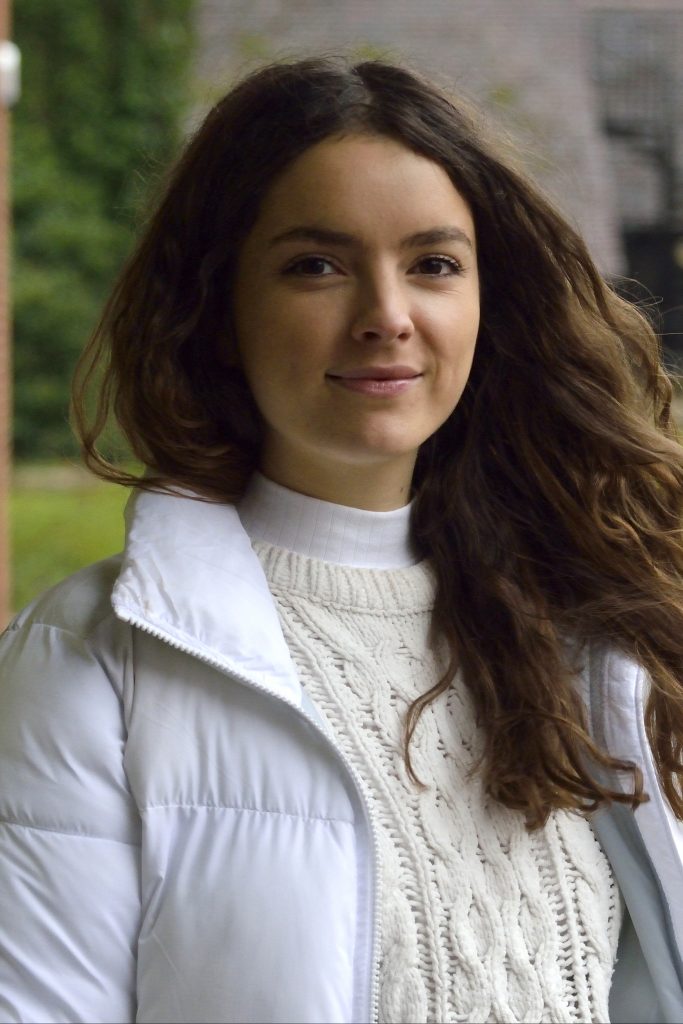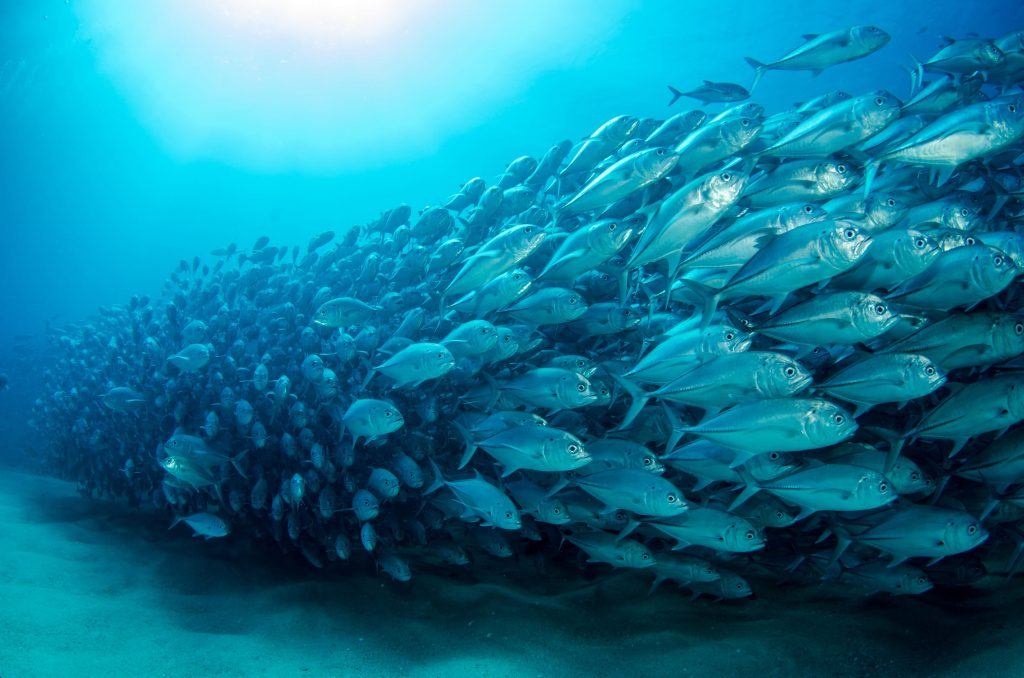
Sophie Peutrill is Compassion in World Farming’s Global Campaign Manager for the Rethink Fish campaign, the campaign to highlight the suffering of trillions of fish each year due to their global consumption by humans. Here Sophie describes their suffering and the campaign to end it.
Sophie Peutrill

Compassion in World Farming (Compassion) is a charity that works on improving welfare standards for farmed animals, with the mission to end factory farming. This usually brings up images of hens being freed from tiny cages and cows being given access to pasture. But there are 160 billion other animals that you might not consider being farmed around the world today in mostly intensive conditions.
Fish are the most exploited and misunderstood animals on the planet. Like other farm animals they can suffer or feel the joys of living depending on how we treat them. Fish matter, yet their welfare is largely ignored.
Global consumption of fish has doubled since the early 1970s and is continuing to rise. The numbers are vast – it’s estimated that between one and three trillion fish are killed for food every year. This is a result of the huge growth of intensive fish farming and wild fishing over the past few decades.
Fish farms account for over half the fish eaten worldwide; Europe alone produced around 1 billion fish in underwater cages in 2015. These fish often live for years in barren, cramped and dirty environments that do not meet their basic needs. Although slaughtering fish for food has become more prevalent over recent years, fish welfare is still lagging, and the majority of fish endure slow, painful deaths without pre-stunning.
We also face a global crisis of over-fishing; In the wild, fish numbers are catastrophically plummeting. By some estimates, 90 percent of big fish have been hauled out of their watery home. If fishing continues at the current rate, our oceans will be depleted by 2050.
To tackle these issues, Compassion recently launched a new fish welfare campaign called Rethink Fish to fight for better representation and stronger legal protections for fish.
The Extraordinary Complexities of Fish
Fish are extraordinary creatures: complex, intelligent, sensitive and curious. Like many other animals, they explore, travel, socialise and play. They perform impressive behaviours – some have been shown to use tools, care for their young, and some species have even been observed hunting collaboratively.
Our understanding of the inner lives of fish is growing rapidly. Fish not only have highly developed senses with excellent taste, smell, hearing and colour vision but scientists have discovered fascinating characteristics that stem from the same foundations as ours: a complex nervous system, a brain that can detect pain, process emotions and learn from mistakes, and a drive to survive. Fish can also feel fear, essential in the wild for avoiding predators and dangerous situations, but detrimental for their well-being in captivity where they cannot escape stressful environments.
Despite these revelations about the incredible complexities of fish and their capacity to suffer, legal protection for fish welfare, within farms and wild fishing, is woefully inadequate.
Farmed Fish
Today, billions of fish are living miserable lives in crowded, grim underwater factory farms.
Good animal welfare depends on taking care of three fundamental components: physical well-being, mental well-being and natural living. In intensive fish farms, all three of these are often neglected.
Fish are overcrowded in barren conditions where they grow to size before slaughter – a process that can take several years. Fish cages can’t meet the needs of the emotionally complex fish and severely restrict their natural behaviours – the fish have nothing to do but swim listlessly in circles.
Additionally, overcrowded fish are more susceptible to disease and suffer more stress, aggression, and physical injuries such as fin damage. Along with lack of space, overcrowding can also lead to poor water quality, so the fish can slowly suffocate from a lack of oxygen in polluted waters.
Recent investigations into Scottish salmon farms found farms that were dirty, overcrowded and full of sick and deformed fish. Parasite epidemics mean that the salmon, trapped in polluted waters, are being eaten alive by sea lice. The issue is caused by too many fish being farmed in one area, giving the lice the perfect conditions to survive and multiply. They also infect the migrating wild salmon whose numbers have seriously declined since salmon farming has been introduced to the area. This is a huge problem causing millions of salmon to die every year and, yet, the industry plans to expand even further.
With regard to slaughter, whether wild-caught or farmed, fish often go through a prolonged, painful and terrifying process. Compassion’s undercover investigation of sea bass, sea bream and trout farms across Europe found considerable suffering during the slaughter process. A mixture of water and ice is used to kill fish without stunning, where these sensitive animals are plunged into freezing ice slurry and left to slowly suffocate to death. This process is cruel and ineffective – some fish were seen to still be fighting for survival over an hour, with some even attempting to escape after being packaged in Styrofoam boxes for sale.
Other methods include slow suffocation in air, distressing exposure to carbon dioxide and, in worst cases, the fish are gutted alive and left to die. Many fish remain conscious and aware of pain for several minutes after having their gills cut and being left to bleed out. More humane methods of slaughter do exist – British and Norwegian farmed fish are generally stunned before killing. Yet, without legislation in place, most producers prefer to keep their costs down and do not buy the equipment needed for a quick and humane death.

The Hidden Trillions
Fish farming has expanded in answer to the increasing demand for fish and the limited supply remaining in the oceans. However, many farmed fish species such as trout and salmon are carnivorous. This means that, in the wild, they hunt other fish. In aquaculture, where farming happens in nets or tanks, fish are fed using wild-caught fish. Instead of relieving pressure on wild fish stocks, the aquaculture industry is adding to it by taking more fish out the sea and using them for ‘feed’. The fish that are used to make farmed fish feed (fishmeal and fish oil) are small forage fish that are important food source for many larger species and aquatic mammals, so the impact on ocean ecosystems is huge; it can take up to 350 wild-caught fish to raise a single farmed salmon. Since these wild fish die without humane slaughter, the welfare cost of the feed is massive.
In 2019, Compassion joined forces with the Changing Markets Foundation to release a ground-breaking report: ‘Until the Seas Run Dry: How Industrial Aquaculture is Plundering the Oceans’. The report revealed as many as 1 trillion wild-caught fish are ground down into fishmeal and fish oil to feed farmed fish – that’s 1 in 3 fish caught globally.
The report also revealed human rights abuses in the aquafeed sector, a lack of transparency, and the devastating impact of overfishing and illegal fishing on the marine environment.
The Fight for Fish
Compassion is tirelessly campaigning to raise awareness with the public, businesses and decision makers on the complexities of fish, their ability to suffer and the consequent need for strong welfare protections, such as legislation for more humane slaughter.
So far, 100,000 Europeans have taken action for fish, demanding that their Agricultural Ministers implement humane slaughter legislation.
In November 2019, Compassion organised a fish welfare exhibition in the European Parliament where over 25 MEPs from across the party spectrum signed our letter highlighting the need for fish legislation.
In 2019, Compassion held its first ever Fish Forum which brought together scientists, representatives from the UK’s biggest retailers and the fish farming industry and marked a significant step forwards for farmed fish welfare throughout Europe. Resources were provided to inspire companies to embrace improvements in the treatment of farmed fish and during slaughter.
Further global achievements include:
In Poland and the Czech Republic, supermarkets tend to sell live carp during the Christmas period, which is a cruel process that causes lots of suffering for the fish. Tesco in Poland and other Polish supermarkets have since banned the sale of live carp thanks to the amazing work of Compassion’s Polish office and volunteers in collaboration with other Polish NGOs.
Compassion achieved over 400,000 views on a Czech campaign video asking the Czech Parliament to ban the live sales of carp.
Compassion teamed up with the online media agency Plant Based News to create a fun and informative video debunking the pervasive myth that goldfish have a 3-second memory span.
Compassion will continue campaigning for the welfare of fish until all farmed and wild-caught fish have a life worth living and their suffering is minimised at time of death. There is much work to do but our dedicated efforts are helping to place fish firmly alongside other farm animals as worthy of welfare protections, as well as raise awareness of their complex inner world.
What can you do?
Compassion believes that we need to move towards a sustainable and humane food system for people, animals and the environment; a regenerative agriculture system without the cruelty of factory farming. From the perspective of human health, sustainability and animal welfare, everyone should be eating less meat and fish, and if they do eat animal products, they should eat higher welfare meat, fish, dairy and eggs.
However, it’s difficult to find higher welfare fish products due to welfare issues common across the industry. Unless explicitly stated to the contrary, it’s likely that fish being sold in supermarkets, restaurants or other outlets suffered immensely either during rearing, capture or slaughter. It’s, therefore, important to engage with brands and retailers and ask about their position on fish welfare and push them do more in this area
Find out more about how you can get involved at www.Rethink.Fish


